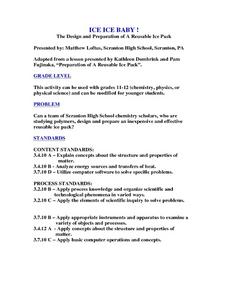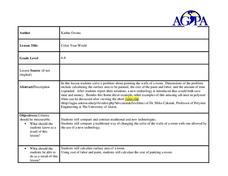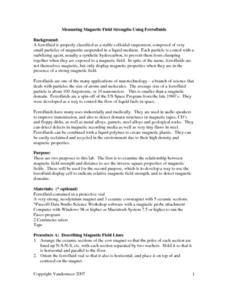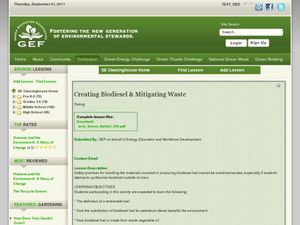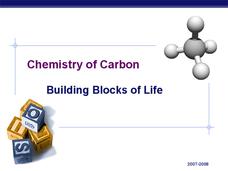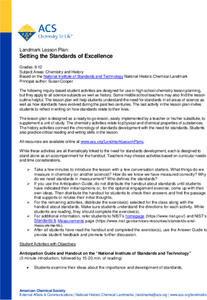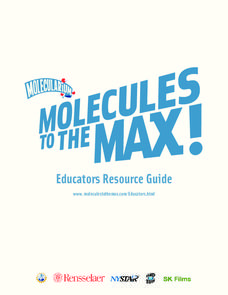DiscoverE
Creepy Putty
Mold your learners into materials engineers. Using glue, Borax, and water, scholars create a viscoelastic material. But your class might know it by another name—Silly Putty.
Curated OER
Ice Ice Baby! The Design and Preparation of A Reusable Ice Pack
Pupils explore polymers by designing and preparing an inexpensive and effective reusable ice pack. They develop and test a design for a reusable ice pack in the science lab. Students apply chemical and physical properties of polymers and...
Curated OER
Bouncing Balls
Students create a polymer to demonstrate its properties and develop an awareness of the wide variety of uses for polymers.
Curated OER
Bouncing Balls
Students create a polymer ball in the lab. In this chemistry lesson plan, students identify the different properties of the polymer they created. They explain what type of chemical reaction took place.
Curated OER
Oil Embargo!
Ninth graders generate and analyze data to determine which and how much of two polymers best absorb oils, formulate procedure to accurately determine how many times its own weight particular polymer can absorb, and develop understanding...
Curated OER
Biology E3 Project Instructional Plan
Ninth graders design a device to treat aneurism. For this biology lesson, 9th graders create a polymer in the lab and explain its uses. They identify the different diseases affecting the circulatory system.
Curated OER
Superballs
Young scholars mix two different solutions to become more familiar with molecules and polymers. In this chemistry lesson, students decide whether or not the reaction between two solutions is chemical or physical. Young scholars then...
Curated OER
Color Your World
Learners calculate the cost of painting a room. In this surface area lesson, students create a scale model from provided dimensions of a bedroom. Groups use area formulas to find square footage, from which materials and labor costs are...
Curated OER
Monomer and Polymer Chemistry
Students explain monomer/polymer chemistry of starches and sugars.
Curated OER
Measuring Magnetic Field Strengths Using Ferrofluids
Students explore the field of nanotechnology by examining magnetic field strength in ferrofluids. They use probes attached to a computer program to determine the relationship between magnetic field strength and magnetic field lines.
Virginia Department of Education
Soap, Slime, and Creative Chromatography
Do you think chromatography paper suffers from separation anxiety? Young chemists make soap, slime, silly putty, and experiment with chromatography in this lesson. The material includes clear instructions for each experiment along with...
Teach Engineering
Preconditioning Balloons: Viscoelastic Biomedical Experiments
What does stretching a balloon have to do with equilibrium? Groups explore preconditioning by stretching a balloon to a point of equilibrium. They then measure the amount of force required to stretch the balloon to the same point several...
Cornell University
The Making of Macromolecules
Compare and contrast macromolecules made from the same elements. Young scholars learn how the structure of a molecule has as much influence on a compound as the elements in the molecule. They experiment with molecular model kits to...
Teach Engineering
Edible Algae Models
Sometimes it's okay to eat your science experiment. A hands-on activity has pupils create models for algae to learn about its cellular structure. The best part of the experiment? The resulting juice-filled gels are edible—yum!
Curated OER
Plastic Polymers
Learners learn about plastic. In this plastic polymers lesson, students examine the properties of plastic, its variety of uses and how it is recycled.
Curated OER
How to Clean Up an Oil Slick
Students explore how an oil spill is contained and cleaned up. They investigate an oil absorbing polymer that is hydrophobic, absorbs up to 19 times its own weight in nonpolar liquids, floats on water, and can be reused or disposed of by...
Curated OER
The Four Groups of Biologically Important Compounds
This is not they typical set of teacher instructions. It is an organized chart of the important organic compounds. For each, the involved elements, the name of the building block monomers, the names of polymers, extra information, and a...
Curated OER
Creating Biodiesel and Mitigating Waste
Biotechnology pros produce their own biofuel using waste oil and fresh vegetable oil. They test the quality of their product using titration techniques and pH analysis. They write their observations and report their findings. Be aware...
Curated OER
Character Traits in Fables
Combining art, music, dance, and reading comprehension, this lesson is geared to reach all ability levels. After reading a variety of fables and discussing story elements and character traits, class members select a moral to use as the...
Curated OER
Chemistry of Carbon - Building Blocks of Life
A great review of the structure and function of carbon-based molecules important to life, especially with relevance to humans. The chemistry behind the combination of polymers and the breakdown of bonds is covered. Valuable content...
Curated OER
Organic Chemistry Reactions
In this organic chemistry reactions worksheet, students are given a table with 8 different types of reactions that occur with organic molecules. Students answer 3 questions about the reactions given in the table and indicate which...
American Chemical Society
Setting the Standards of Excellence
A number doesn't have much meaning without a standard of reference. Learners read about the history of developing standards to measure chemical and physical properties and complete reading guides to process the information. They focus on...
Rensselaer Polytechnic Institute
Molecules to the Max!—Educators Resource Guide
From molecules to nanotubes, an engaging unit explores the world of tiny science. Fifteen hands-on experiments and lessons engage young scientists as they learn chemistry. Discussions, worksheets, and data analysis reinforce the concepts...
Curated OER
WS 10.9 Plastic Recycling
In this recycling worksheet, students search for as many types of plastics categorized with the resin identification codes and fill in a chart for each plastic type. They identify the product name, the category the plastic is in, the...



